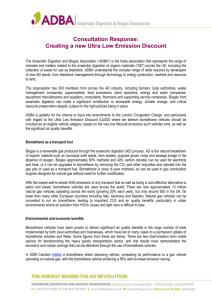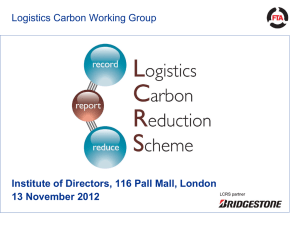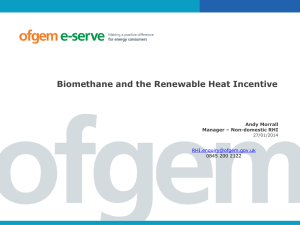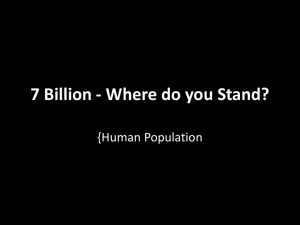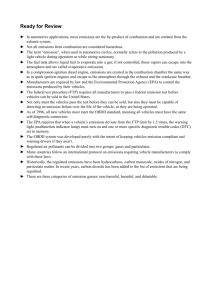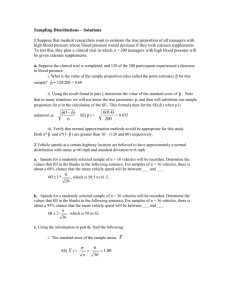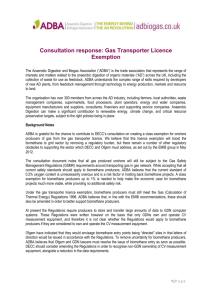130121-TFL-Congestion-Charge-FINAL-VERSION
advertisement
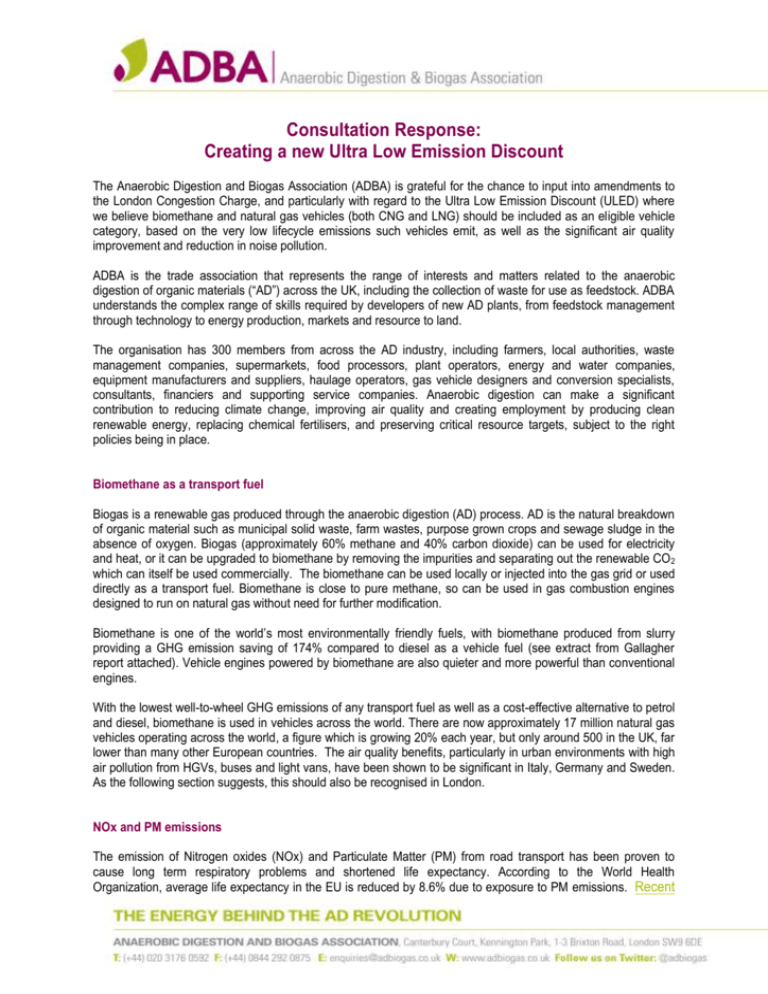
Consultation Response: Creating a new Ultra Low Emission Discount The Anaerobic Digestion and Biogas Association (ADBA) is grateful for the chance to input into amendments to the London Congestion Charge, and particularly with regard to the Ultra Low Emission Discount (ULED) where we believe biomethane and natural gas vehicles (both CNG and LNG) should be included as an eligible vehicle category, based on the very low lifecycle emissions such vehicles emit, as well as the significant air quality improvement and reduction in noise pollution. ADBA is the trade association that represents the range of interests and matters related to the anaerobic digestion of organic materials (“AD”) across the UK, including the collection of waste for use as feedstock. ADBA understands the complex range of skills required by developers of new AD plants, from feedstock management through technology to energy production, markets and resource to land. The organisation has 300 members from across the AD industry, including farmers, local authorities, waste management companies, supermarkets, food processors, plant operators, energy and water companies, equipment manufacturers and suppliers, haulage operators, gas vehicle designers and conversion specialists, consultants, financiers and supporting service companies. Anaerobic digestion can make a significant contribution to reducing climate change, improving air quality and creating employment by producing clean renewable energy, replacing chemical fertilisers, and preserving critical resource targets, subject to the right policies being in place. Biomethane as a transport fuel Biogas is a renewable gas produced through the anaerobic digestion (AD) process. AD is the natural breakdown of organic material such as municipal solid waste, farm wastes, purpose grown crops and sewage sludge in the absence of oxygen. Biogas (approximately 60% methane and 40% carbon dioxide) can be used for electricity and heat, or it can be upgraded to biomethane by removing the impurities and separating out the renewable CO 2 which can itself be used commercially. The biomethane can be used locally or injected into the gas grid or used directly as a transport fuel. Biomethane is close to pure methane, so can be used in gas combustion engines designed to run on natural gas without need for further modification. Biomethane is one of the world’s most environmentally friendly fuels, with biomethane produced from slurry providing a GHG emission saving of 174% compared to diesel as a vehicle fuel (see extract from Gallagher report attached). Vehicle engines powered by biomethane are also quieter and more powerful than conventional engines. With the lowest well-to-wheel GHG emissions of any transport fuel as well as a cost-effective alternative to petrol and diesel, biomethane is used in vehicles across the world. There are now approximately 17 million natural gas vehicles operating across the world, a figure which is growing 20% each year, but only around 500 in the UK, far lower than many other European countries. The air quality benefits, particularly in urban environments with high air pollution from HGVs, buses and light vans, have been shown to be significant in Italy, Germany and Sweden. As the following section suggests, this should also be recognised in London. NOx and PM emissions The emission of Nitrogen oxides (NOx) and Particulate Matter (PM) from road transport has been proven to cause long term respiratory problems and shortened life expectancy. According to the World Health Organization, average life expectancy in the EU is reduced by 8.6% due to exposure to PM emissions. Recent statistics publicised by the Clean Air in London group also show that in 2010, long-term exposure to ‘man-made’ air pollution contributes to 5.6% of deaths in England, and almost one in ten deaths in the City of London. As well as the terrible environmental impacts, on 7 March 2013 the UK’s Supreme Court will hear a case against Defra brought by NGO ClientEarth on the UK’s failure to meet legally-binding standards for nitrogen dioxide (NO2) in 35 of 43 zones across the country. With London having the worst air of any European capital and the UK facing large ongoing fines for not complying with EU air quality standards, ADBA believes that tackling this issue now is vitally important for both health and financial reasons. There is a clear case for supporting biomethane and natural gas vehicles as part of the solution. As is shown in the Coca-Cola case study below, the use of gas vehicles drastically reduces both NOx and PM emissions, compared to diesel vehicles – with NOx emissions falling by 85.6% and PM emissions falling by 97.1%. Case Studies There are few short to medium term viable options for decarbonising the heavy goods transportation sector. Biomethane vehicles have been proven to deliver significant air quality and GHG emission benefits in the large number of trials carried out by both local authorities and businesses, which have led in many cases to a permanent uptake of biomethane vehicles and fleets. In 2009 Camden trialled a biomethane street cleansing vehicle, comparing its performance to a gas vehicle operating on natural gas, with the biomethane vehicle achieving a 56% well-to-wheel emission saving. Leeds City Council trialled biomethane powered refuse collection vehicles between May 2009 and July 2010, achieving a lifecycle CO2 saving of 49% compared to its diesel equivalent. Coca-Cola recently undertook a year-long trial of gas vehicles, orderjng a fleet of 14 gas vehicles at the conclusion of the trial on the basis of the results. These showed 50% GHG emissions savings alongside reduced fuel costs of nearly 15% and reduced NOx and PM emissions of 85% and 97% respectively, compared to a diesel vehicle. Role within ULED ADBA believes that the key obstacle to the development of a mature biomethane and natural gas vehicle market in the UK has been the lack of effective long term government incentives to stimulate investment in infrastructure and vehicles. Although there have been some encouraging developments, particularly with regard to Defra funding for the development of a gas vehicle hub and air quality funding which is supporting a large number of low emission zone studies across English local authorities, more can be done to realise the benefits of biomethane and natural gas in vehicles. Making biomethane and natural gas vehicles eligible for a 100% discount from the London Congestion Charge would greatly improve the air quality in London by incentivising their use for businesses and individuals who have to make frequent journeys within the Congestion Charge zone. As well as reducing vehicle noise and tackling the air pollution and GHG emissions in London, this would provide a broader benefit for the industry in terms of demonstrating the viability of the vehicles by providing an incentive which would allow businesses to more easily integrate gas vehicles into their transport fleets. Extension to HGVs We also believe it is vital that the ULED is extended to include larger commercial vehicles, rather than only cars and light vans. The premium cost of purchasing a natural gas/biomethane HGV is far greater than that for a car or van, and therefore a greater incentive is needed to support this vehicle category. One of the key benefits of supporting biomethane/natural gas vehicles in London is the massive contribution that can be made to cutting NOx and PM emissions from HGVs, and hence excluding this vehicle category would prevent the sector from realising one of its most important benefits. Dual Fuel vehicles ADBA believes that alongside dedicated natural gas vehicles, duel fuel vehicles should also be supported under the ULED. There is a lack of refuelling infrastructure in the UK at present which precludes many operators from running dedicated natural gas fleets. Operators purchasing dual fuel vehicles are extremely unlikely to run them on 100% diesel for cost reasons. The use of more dual-fuel vehicles will ultimately lead to the development of more refuelling infrastructure and a growth in the biomethane and natural gas vehicle market. Next steps We would be happy to meet at a date of your convenience to further discuss the potential role of biomethane/natural gas vehicles in the ULED criteria, as well as providing evidence on the number of vehicles that we expect would benefit from being eligible under the 100% discount.
